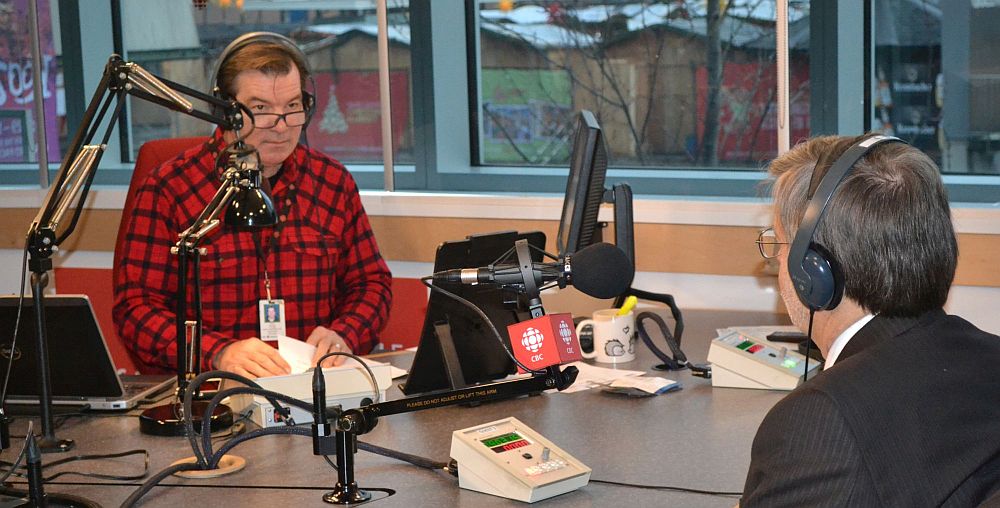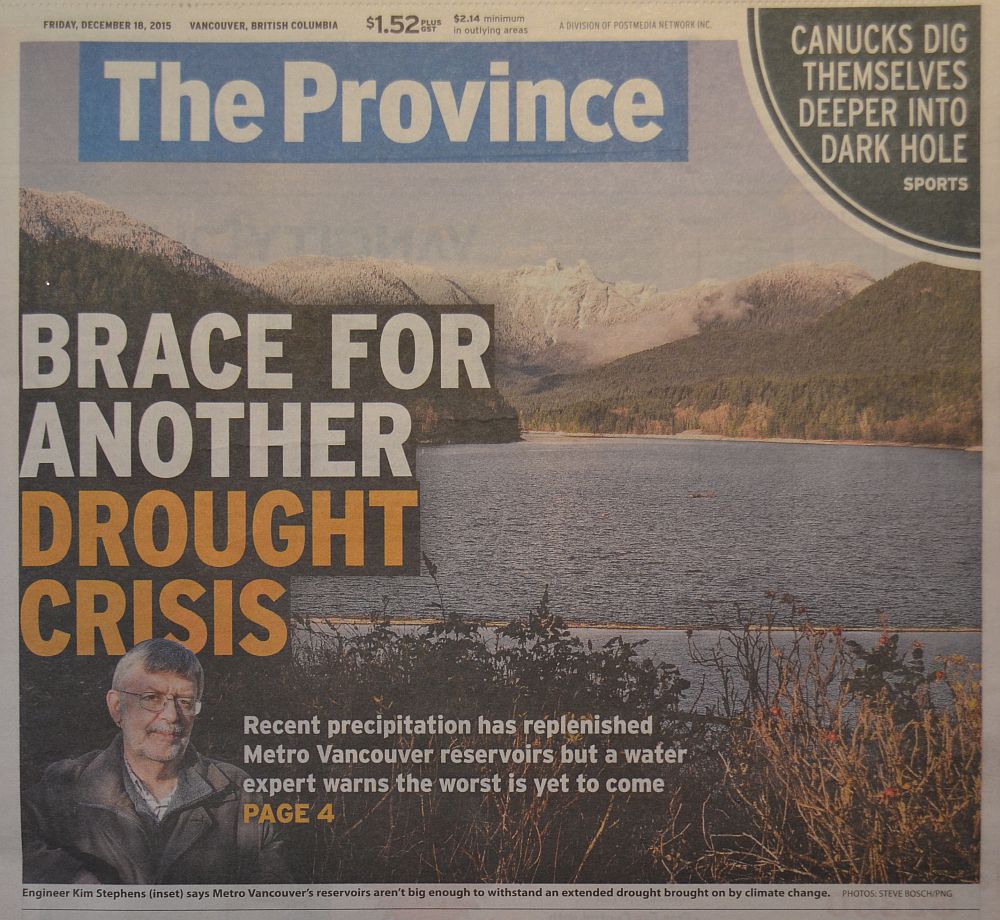BRITISH COLUMBIA’S NEW CLIMATE REALITY: “Brace for another drought crisis in 2019,” stated Kim Stephens, Executive Director of the Partnership for Water Sustainability, when he reflected on crossing an invisible threshold to a new climate regime (June 2019)
Note to Reader:
British Columbia’s climate is changing; and change is occurring at a rate much faster than anticipated. Looking back, 2015 marks the beginning of a ‘new normal’ or ‘new reality’ which is defined by recurring extremes. Floods, drought, forest fires and windstorms – all are happening within the same year, and year after year.
In 2019, British Columbians are now in Year 5 of this new reality: warmer, wetter winters; longer, drier summers. Droughts, dwindling snow packs, melting glaciers, beleaguered salmon runs and costly forest fire seasons are followed by windstorms and heavy rains.
In December 2015, as recognition was dawning that our climate really was changing, both of British Columbia’s major newspapers published front-page news stories that drew attention to the work of the Partnership for Water Sustainability. In addition, both CBC Radio and CBC TV sought out the Partnership for a perspective on The Top Story of 2015, that is – the drought that started in Winter 2015 and continued through Summer 2015.
Almost five years later, it is timely in Summer 2019 to re-cap what occurred in 2015 and reflect on what it foreshadowed going forward through time.
Drought on the West Coast: A New Reality
The drought that extended through the winter, spring and summer of 2015 – from Vancouver Island to Manitoba, and from Mexico to the Yukon – suggested we were crossing an invisible threshold into a different hydro-meteorological regime in Western North America. Five years later, it is clear that we have indeed crossed a threshold. This has huge consequences for water security.
Communities can no longer count on a predictable snowpack and reliable precipitation to maintain a healthy water balance in their watersheds. It has been difficult even for experts to grasp the extent of what the loss of relative hydrological stability means. In 2015, in an online poll conducted by CBC News, the public chose the drought as British Columbia’s “Top Story of 2015”.
Hydro-Climatic Change & Its Consequences
“After a period of relative hydro-climatic stability, changes in the composition of the Earth’s atmosphere have resulted in the acceleration of the global hydrologic cycle with huge implications for every region of the world and every sector of the global economy,” stated Bob Sandford, keynote speaker for the Feast AND Famine Workshop co-hosted by the Partnership for Water Sustainability and Irrigation Industry Association on December 1, 2015 in Richmond, BC.
Bob Sandford holds the EPCOR Chair in Water and Climate Security at the United Nations University Institute for Water, Environment and Health. In this capacity Bob was the co-author of the UN Water in the World We Want report on post-2015 global sustainable development goals relating to water. Bob Sandford is called “Canada’s Winston Churchill of Water”.
“We can expect deeper, more persistent drought punctuated by flooding. It is interesting to think about how these kinds of changes make historic averages meaningless,” emphasized Bob Sandford at the Feast AND Famine Workshop.
Bob Sandford’s observations and perspective provided context for selection of the 2015 drought as The Top Story of 2015.
“We will look back at 2015 as THE teachable year,” stated Kim Stephens in media interviews about the long-term impact of drought conditions in Southwest British Columbia
Media attention initially resulted from coverage of the Feast AND Famine Workshop. The Vancouver Sun’s Larry Pynn attended and this led to an interview and headline story featuring Ted van der Gulik, Partnership President. This coverage was followed by 7 newspaper, radio and television interviews featuring Kim Stephens, Partnership Executive Director.
 “In all seven interviews, I emphasized that the ‘new normal’ in BC is drought and flooding,” says Kim Stephens. “The summer dry season has extended on both ends. Communities can no longer count on a predictable snowpack and reliable rain to maintain a healthy water balance in watersheds. This is putting water supply systems and ecosystems under extreme stress. What you do on the land or how you treat the land has direct implications and consequences for water use.”
“In all seven interviews, I emphasized that the ‘new normal’ in BC is drought and flooding,” says Kim Stephens. “The summer dry season has extended on both ends. Communities can no longer count on a predictable snowpack and reliable rain to maintain a healthy water balance in watersheds. This is putting water supply systems and ecosystems under extreme stress. What you do on the land or how you treat the land has direct implications and consequences for water use.”
“Other than Bob Sandford, few water practitioners really appreciated that 2015 was indeed the first year of British Columbia’s new reality, and that is – warmer, wetter winters and longer, drier summers. By 2018, there was little doubt that the extent of drought and forest fires in the Northern Hemisphere may define a turning point in human history.
“As Bob Sandford emphasized in a speech in early 2019, the point here is that there is evidence all around us to suggest that if we don’t address the root problem our society, and every economic sector within it, should expect direct and indirect impacts to keep pace with accelerating global hydro-climatic change.”
On December 2, headline story in the Vancouver Sun:
 Food security, protection of agricultural lands and water use are issues facing BC. Ted van der Gulik provided this quotable quote: “I support market gardens. They’re good. It’s great to grow food in parking lots, having people grow their own food. Just don’t call them food security,” he said.
Food security, protection of agricultural lands and water use are issues facing BC. Ted van der Gulik provided this quotable quote: “I support market gardens. They’re good. It’s great to grow food in parking lots, having people grow their own food. Just don’t call them food security,” he said.
December 18, headline story in the Vancouver Province:
 “Despite the current deluge of rain and snow, Vancouverites could well be facing another drought crisis this summer. Kim Stephens said that Metro Vancouver’s two ‘comparatively small’ reservoirs were designed for repeated rainfalls and heavy snow in the mountains. Those conditions are not expected to apply over the next nine months and the population has grown to about 2.5 million people,” wrote Kent Spencer in a front-page story headlined Brace for Another Drought Crisis.
“Despite the current deluge of rain and snow, Vancouverites could well be facing another drought crisis this summer. Kim Stephens said that Metro Vancouver’s two ‘comparatively small’ reservoirs were designed for repeated rainfalls and heavy snow in the mountains. Those conditions are not expected to apply over the next nine months and the population has grown to about 2.5 million people,” wrote Kent Spencer in a front-page story headlined Brace for Another Drought Crisis.
“In a nutshell, the issue and concern can be summarized in four points: Southwest BC dodged a bullet this past summer (2015); there have been past crises; there is a repeating pattern; and increasing water supply storage is problematic,” summarizes Kim Stephens.
December 23 – feature story on “CBC News at 6″:
 “This past summer was one of the hottest and driest on record, causing severe water shortages across our south coast, and fueling one of the worst wildfire seasons we have had in a decade. Given what we had this year, how does it bode for next year,” asked Dan Burritt when he interviewed Kim Stephens. CBC Poll: 2015 Drought is British Columbia’s “Top Story of the Year”
“This past summer was one of the hottest and driest on record, causing severe water shortages across our south coast, and fueling one of the worst wildfire seasons we have had in a decade. Given what we had this year, how does it bode for next year,” asked Dan Burritt when he interviewed Kim Stephens. CBC Poll: 2015 Drought is British Columbia’s “Top Story of the Year”
December 23 – interviews on CBC radio early morning “news talk” shows in four regions (Lower Mainland, Vancouver Island, Kamloops and Prince George):
“There were many stories to choose from, but with help of our audience we narrowed it down to just one. The summer drought and wildfire season has been chosen as the top news story of 2015,” stated CBC radio host Stephen Quinn. “Kim Stephens thinks we are in for more drought-like conditions in 2016. How much of that has to do with the snowpack? Last year we had barely any snow. Do we know this early on whether that could change this year,” he asked.

Stephen Quinn of CBC Radio interviews Kim Stephens, Partnership for Water Sustainability in BC, on “The Early Edition” show for December 23 (Click on image or follow this link: https://waterbucket.ca/atp/files/2015/12/Kim-Stephens.mp3)
January 10, 2016 – feature interview on Roundhouse Radio:
 Kirk LaPointe, host of the “Our City” morning show on Roundhouse Radio, invited Kim Stephens for an in-depth conversation about water, in particular the local implications of the drought that extended from Vancouver Island to Manitoba and from Mexico to the Yukon in 2015. Kim Stephens elaborated on how he believes 2015 ranks with 2003 as a defining ‘teachable year’ for facilitating a paradigm-shift in the water ethic of British Columbians.
Kirk LaPointe, host of the “Our City” morning show on Roundhouse Radio, invited Kim Stephens for an in-depth conversation about water, in particular the local implications of the drought that extended from Vancouver Island to Manitoba and from Mexico to the Yukon in 2015. Kim Stephens elaborated on how he believes 2015 ranks with 2003 as a defining ‘teachable year’ for facilitating a paradigm-shift in the water ethic of British Columbians.


